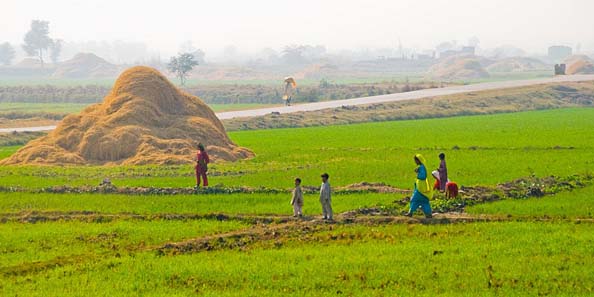Nutrition sensitive agriculture
How can the nutrition components of agricultural interventions be strengthened? And how can the nutrition impacts, of existing agricultural interventions, be enhanced?

Photo credit: Benny Lin
Innovative agricultural interventions may improve agricultural productivity, reduce poverty, improve access to services, and improve food and nutrition security. This in turn may improve nutrition and health outcomes. Impacts vary in nature and strength and may be hard to capture. Studies under this research theme seek to understand whether, why and how agricultural interventions improve nutrition.
See lead research Alan Dangour introducing this research theme here.
Pathways between agriculture and nutrition
- Local level interventions in largely non-commercial agricultural systems, especially where a large part of the produce is consumed by local producers, may result in diversified diets;
- Another important pathway may be through the mitigation of extreme poverty, especially among landless groups.
- Nutrition knowledge amongst women, child feeding practices and women’s control over income and assets may also have a positive impact on nutritional outcomes. Women’s agency is likely to be pivotal in many contexts, both for the development of agriculture, as well as increasing the nutrition impacts of agriculture – though these links need further elucidation. While feminisation in agricultural work in South Asia is occurring in some areas, greater engagement by women in agriculture does not necessarily result in greater power and control over decision-making. Furthermore, women’s low level of literacy, limited asset holdings and often restricted access to credit and technology hinders their ability to adopt agricultural innovations, which could increase productivity.
Gaps in the research
There are information gaps in the evidence base of agricultural intervention studies aiming to improve nutrition outcomes. For example, we do not know:
- What are the most appropriate methodologies for evaluation?
- What are the characteristics of successful programmes?
- How can successful programmes be delivered at scale?
- How can the evidence be linked with policy generation?
Nutrition sensitive agriculture
To find the answers to these questions and identify what factors lead to improved nutritional outcomes, we will study four agricultural interventions. This will help us discover how to strengthen the nutrition components of agriculture interventions and enhance the impacts of existing agricultural interventions on nutrition outcomes.
LANSA will assess the nutritional impact of four pro-nutrition agricultural interventions.
This includes:
- Feasibility study on the transfer of agricultural assets to women and its potential implication on nutrition in Pakistan
The study, led by CSSR and LCIRAH, will be conducted in two phases and will use a mix of qualitative and quantitative research methods. It will build on the Enabling Environments exploratory study on women’s agricultural work and nutrition, and also examine design and governance issues in existing programmes (mainly the land grant to landless women scheme), to draw conclusions for the feasibility of a more effective programme. Read more
- Assessing the impact of nutrition related behaviour change communication using communication technologies in India
LANSA conducted a feasibility study of an intervention aimed at integrating behaviour change communications (BCC) around caring practices for infants and young children, into a programme to diffuse improved agricultural practices. The study includes qualitative methods such as exit polls and use of videos to assess the potential of the programme to influence perception and knowledge on key nutrition relevant behaviour and norms. Read more
- A feasibility study of the Farming System for Nutrition intervention in India
Under LANSA, the Farming System for Nutrition (FSN) study led by the M.S. Swaminathan Research Foundation (MSSRF) potentially seeks evidence on “How agricultural interventions can be pro-nutrition?” The FSN study in underway in selected resource poor villages in two districts with high burden undernutrition, viz. Wardha in the state of Maharashtra, and Koraput in the state of Odisha. Read more
- Farming system for improved nutrition: a formative study in Bangladesh
The objective of the study was to understand the perceptions and needs of local farming communities to promote their farming systems for better nutrition and the way of addressing their needs particularly in context of Bangladesh. Read more







